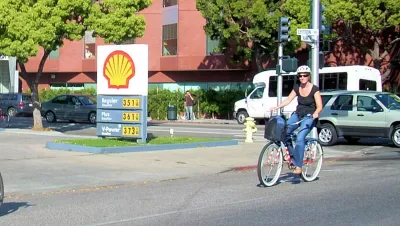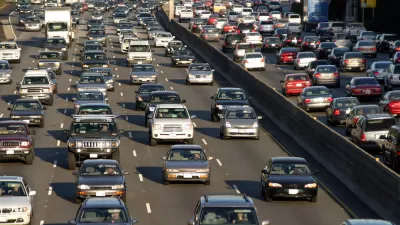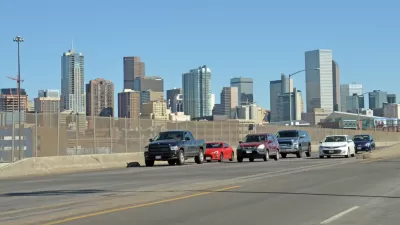Californians will determine whether to repeal recent fuel tax and user fee increases; Missourians to vote on a 10-cent gas tax hike over 4 years; Coloradans whether to hike the sales tax, and the most interesting measure will be decided in Utah.

The advisory question came as part of a bigger deal that Utah lawmakers reached in order to fend off a ballot measure that would have increased the state’s income and sales taxes to generate $715 million for schools. Polls showed that a majority of Utahns supported the “Our Schools Now” initiative before the deal was struck.
Instead, voters will answer whether they support a 10-cent gas tax increase, which is expected to raise $120 million. Thirty percent of the new money would go toward local roads, while the rest would be dedicated to education. Of course, lawmakers would have to pass the changes for them to take effect.
The funding mechanism is described differently in a July 25 Deseret News opinion by a supporter of the initiative, A. Scott Anderson, president and chief executive officer of Zions Bank. His explanation is important because it shows the extent to which general funds are used for roads, rather than coming from user fees such as fuel taxes. [Opinion also accessible here.]
The proposal uses an innovative mechanism to get more money into Utah classrooms. Currently, Utah spends hundreds of millions of dollars of general fund money to build and maintain state roads and highways. If the fuel tax is increased by 10 cents per gallon (costing the average driver $48 more per year), then more of transportation needs would be funded by highway users, and some $101 million of general fund money would be freed up to be used for education.
The Ballotpedia description of Question 1 supports Anderson's description of the funding mechanism. It also states that "[b]ecause of Utah Constitutional Amendment No. 2, approved by voters in 1962, all gas tax revenue is dedicated to transportation funding." This is known as a transportation lockbox.
The Utah legislature passed legislation in March 2015 to hike gas and diesel excise taxes 4.9 cents per gallon on Jan. 1, 2016. The fuel tax increase then converted to a wholesale fuel sales tax, resulting in small annual increases.
Support for Higher Gas Tax in Missouri
"In Missouri, there seems to be no organized opposition to a ballot measure that would raise the state's fuel taxes for the first time since 1996," writes Vock.
If approved, the plan would gradually increase the fuel tax by 2.5 cents a year for four years to address chronic funding problems for the state’s road network.
This time around, the sales tax [sic] measure is supported by Gov. Mike Parson, the newly installed Republican governor, and U.S. Sen. Claire McCaskill, the state’s most prominent Democrat.
Dueling funding measures in Colorado
As posted Sept. 6, Coloradans will decide if they want to fund more road repair without raising additional revenue, i.e., issue general obligation bonds, or hike the sales tax, plus allow funding for other modes, by issuing revenue bonds paid from a new sales tax measure.
Fix Our Damn Roads or Proposition 109 will appear on the ballot. It demands the state pass no new taxes for transportation. Instead it encourages lawmakers to use current funding for $3.5 billion in transportation bonds.
Let's Go Colorado or Proposition 110 is a transportation measure aimed at increasing the state sales tax .62 percent. Supporters say it will raise more than $6 billion dollars for transportation needs with over $700 million in new revenue being created in the first year.
The politics behind California's Proposition 6
"Republicans are using a strategy similar to the one in Massachusetts four years ago to make headway this year in another seemingly Democratic stronghold: California," writes Vock.
The three top Republicans in the U.S. House have all contributed to efforts to pass Proposition 6, which would repeal a gas tax hike that is paying for a $54 billion package to build and repair infrastructure. Only one of them -- U.S. Rep. Kevin McCarthy -- is from California.
Related posts in Planetizen:
-
Colorado Voters to Decide How to Fund Roads on Election Day, September 6, 2018Two transportation bonding initiatives will appear on the ballot on Nov. 6: A $3.5 billion measure would have debt repayments come from the general fund, while a $6 billion initiative would create a revenue stream by hiking sales taxes.
-
Two States to Decide on Gas Tax Measures on Election Day, June 11, 2018California voters will likely decide on whether to repeal a 12-cents gas tax increase while Missouri voters will decide whether to increase the state's 17-cents per gallon gas tax, fourth lowest in the nation, by 10-cents per gallon over four years.
-
Utah on Verge of Hiking Gas Tax by 21 Percent, March 16, 2015Just before adjourning for the year, the Republican-controlled Utah House and Senate settled on a compromise—increase the gas tax by a nickel; the first hike in 18 years. Gov. Gary Herbert, also a Republican, has indicated he will sign the bill.
-
Additional posts on the California fuel tax increase can be found under the legislative tag, "SB 1."
FULL STORY: Which States Are Voting on Transportation Funding This Year?

Planetizen Federal Action Tracker
A weekly monitor of how Trump’s orders and actions are impacting planners and planning in America.

Map: Where Senate Republicans Want to Sell Your Public Lands
For public land advocates, the Senate Republicans’ proposal to sell millions of acres of public land in the West is “the biggest fight of their careers.”

Restaurant Patios Were a Pandemic Win — Why Were They so Hard to Keep?
Social distancing requirements and changes in travel patterns prompted cities to pilot new uses for street and sidewalk space. Then it got complicated.

Platform Pilsner: Vancouver Transit Agency Releases... a Beer?
TransLink will receive a portion of every sale of the four-pack.

Toronto Weighs Cheaper Transit, Parking Hikes for Major Events
Special event rates would take effect during large festivals, sports games and concerts to ‘discourage driving, manage congestion and free up space for transit.”

Berlin to Consider Car-Free Zone Larger Than Manhattan
The area bound by the 22-mile Ringbahn would still allow 12 uses of a private automobile per year per person, and several other exemptions.
Urban Design for Planners 1: Software Tools
This six-course series explores essential urban design concepts using open source software and equips planners with the tools they need to participate fully in the urban design process.
Planning for Universal Design
Learn the tools for implementing Universal Design in planning regulations.
Heyer Gruel & Associates PA
JM Goldson LLC
Custer County Colorado
City of Camden Redevelopment Agency
City of Astoria
Transportation Research & Education Center (TREC) at Portland State University
Camden Redevelopment Agency
City of Claremont
Municipality of Princeton (NJ)





























